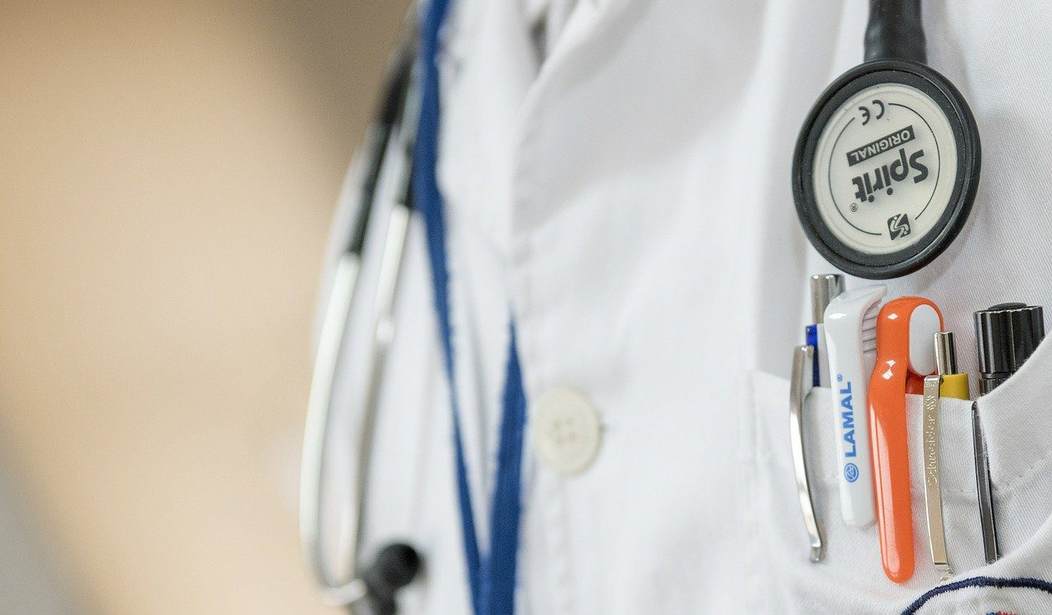The Biden-Harris administration has a new strategy to get more doctors to quiz their patients about gun ownership: pay them.
As Roll Call reports, earlier this month the Centers for Medicare and Medicaid Services rolled out a new incentive for Medicaid providers to talk with patients about owning a gun by allowing Medicaid funds to be dispensed when those queries are made.
Public health advocates hope the conversations become as routine as physicians talking to parents about car seats, water safety, substance use and other safety issues impacting kids.
“For the first time, it’s allowing CMS to consider using Medicaid funds to fund these types of screening questions,” said Chethan Sathya, a pediatric trauma surgeon and firearm injury prevention researcher at Northwell Health, the largest health care provider in New York.
At Northwell, every patient who walks through the door is asked if they have access to a firearm and whether it is locked up, unloaded and stored separately from ammunition.
Northwell offers those with firearms gun locks, but very few health care providers do this.
Incorporating firearm counseling into Medicaid could change things.
“The hope is that this normalizes this question as part of routine medical care,” Sathya said. “When you start funding things, that is the huge incentive for hospitals and providers to integrate this into usual routine medical care, and it provides a revenue stream for that.”
Why would doctors need funding to ask these questions? After all, asking a patient if they own a gun doesn't cost anything. But by opening up the Medicaid money spigot, the Biden-Harris administration is incentivizing healthcare professionals to ask these types of invasive questions.
Biden and Harris have used the White House Office of Gun Violence Prevention to push for a partnership between gun control activists and the healthcare industry, and companies like Northwell Health have been happy to team up with the administration in treating gun violence as a public health issue... and gun control as the cure. For the past five years Northwell has hosted a Gun Violence Prevention Forum where gun control activists and healthcare workers can mix and mingle, with this year's gathering featuring former president Bill Clinton, White House Office of Gun Violence Prevention head Stefanie Feldman, and several other federal officials.
Missing from the event, however, were groups like Doctors for Responsible Gun Ownership, Hold My Guns, and other organizations and individuals who don't believe in masking gun control policies under the guise of public health. Even though many in the "treat gun violence as a public health epidemic" crowd swear it's not about crafting or implementing more restrictive gun laws, the lack of interest in hearing from pro-2A voices in the public health sphere is telling.
If Kamala Harris gets another four years to shape federal policies on guns, Medicaid (and to a lesser degree, Medicare) will be both a megaphone to promote policies like a federal "red flag" law and a ban on so-called assault weapons and large-capacity magazines as well as a carrot to compel healthcare workers to get on board the anti-gun bandwagon.
A CMS spokesperson said Friday that while Medicaid first began allowing coverage of violence prevention-related services in 2021, the latest announcement is clarifying that coverage also includes “anticipatory guidance,” or health education and counseling to help parents and caregivers understand and improve the health and development of their children.
“As a result, states may reimburse for a health care provider counseling parents on firearm safety and injury prevention,” the spokesperson said.
The agency said it is available to provide technical assistance to states who want to strengthen their violence prevention strategies.
Still, how those strategies look will depend on individual states and whether they adopt such coverage through their Medicaid programs.
Public health experts say they should. They argue that having a doctor ask whether there are guns in the home and how they are stored can start important conversations that can save lives.
I don't need my doctor quizzing me about my gun ownership anymore than I need my local firearms instructor asking me questions about my diet. If my primary care physician wants to offer unsolicited advice about how I should store my gun there's nothing stopping him, but if it turns into questions about my gun ownership they're going to get a response of "it's none of your business."
If you feel comfortable talking with your physician about your gun ownership, great. I've had a few doctors where that was the case, but those were also doctors who felt comfortable talking with me about their gun ownership. And honestly, those conversations never centered around things like gun storage. It was mostly talk about our latest purchase, trip to the range, or the latest buck that was bagged during deer season.
The Biden-Harris administration wants to make it the business of docs to ask these questions, but while they're offering incentives to healthcare workers we as gun owners still have the right to decline to answer them.









Join the conversation as a VIP Member